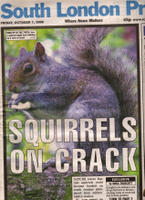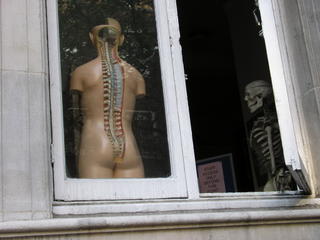
Friday, December 30, 2005
the cold
It is my fourth winter in London, and the cold is not becoming easier. My hands, my nose, my feet, seem to freese within three minutes of cycling. Two pairs of socks and hiking boots, winter gloves and wooly scarf, all have a very limited effect. But it is my bladder that suffers most: it is unclear why, but I find I have to go much more frequently when the tempratures drop. As long as I'm cycling, I seem to control my body mechanisms. But it is when I arrive at the library, and have to lock the bike, that it feels almost impossible. I find myself dancing strange dances around the bike, trying my best to distract my body from its urges. I wonder what the guards think.
Twice in London I lost control on my bladder. Both times happened in February (not the same year). I arrived home late at night after an icy cycle. I was dying to go but somehow managed to open the door, bring the bike inside, and run to the toilets. Only there I could not manage to open my trousers: my hands were so frosen that I could not use my fingers. The frustration was unbearable. I could hold it no longer. Exasperated, I found myself squatting on the toilet seat, my pants wet and smelling of warm, fresh piss. I was laughing and crying at the same time, feeling relief and humilation. At the time, it seemed symptomathic of what London was doing to me: the ways in which it was robbing me of control over my life. It was a humbling experience.
But now I can say it's only piss. And there's nothing wrong with urine. I learnt this last year, at the Villas, when I came to realize the benefits of living with a chamber pot.
Wednesday, December 28, 2005
I had to go up to Newspaper Library at Collindale today. You probably don't know where it is but I do't either. The tube is a very strange way to travel; one seems to emerge out of darkness in unexpected places. It completely mangles your sense of geography.
It's like being beamed somewhere, only it takes longer, and is done in a carriage full of strangers. Plus beaming is less expensive I believe.
I think Collindale is on the North Circular, that mythical boundary of London: again, I have no idea of its route, since my car-experience of London is limited to 4-5 stressful and unfortunate house moves. But the North Circular sounds esoteric, I'm sure it follows some ancient energy lines and involves free-masonry town-planning. Let's put it this way: it's far north. Zone four (ZONFOR in some dialects).
* * *
Coming back on the tube I recalled what Tanya said to me four years ago about adverts on the tube. She said only very specific things are advertised inside the carriages:
* Flu, cold, congestion and fatigue relief - instant magic medications to make you feel better, and more importantly, able to work
* Cheap international phone deals
* Loans - re-mortgaging your house to be even more in debt.
* Cheap travel packages
In short, if you're on the tube, very likely you're: seriously ill but have to work / foreign to this place and want to call home / dying to escape to somewhere sunny / desperately thinking up ways to get easy money / all of the above.
Not much has changed in that respect. There's far less loan adverts; people are a bit more careful with money than they were around 2000. A lot of internet-related things. Unlike the Cinema or the newspapers, there's absolutely no ads for cars.
Strangely, once you're out of the carriages, the adverts change; the escalators and tunnels are a brave new world of opportunities: perfumes and clothes, movies and West-End shows. London as you thought it would be. London which exists nowhere, and everywhere.
* * *
Warren St. loudspeakers: "Please assist us in keeping the underground clean. Help us by taking your litter home with you."
Fair enough.
Monday, December 26, 2005
leaves

Have you noticed the way autumn leaves rub off on the asphalt? It's usually the plane leaves, on coloured patches of the road (cycle paths, pedestrian crossings). Leaves turn to stains, flat and almost abstract. It's like cycling on wallpaper.
Last year, when autumn leaves became a household necessity (but not a commodity) I started noticing them more and thinking about the fall. The austerity and beauty of the whole thing leaves me speechless. They grow, they fall, they disappear without a trace, every year. They crumble into thin air. Like the phoenix. And unlike us.
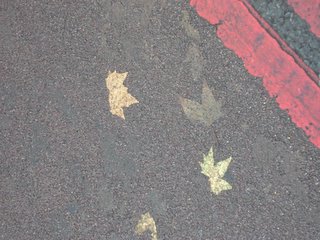
Traces Left Behind
Earlier this year I went up to Scotland for the G8. The night before the opening of the summit we hiked through the hills, camping above a water reservoir. In the morning we discovered on the other side of the reservoir some ancient ruins; they must have been there long before the reservoir. Now they were little more than piles of stones, and some traces of walls.
We kept going; when we hit a gravel road, the first modern human thing we came upon was a jeep telling us not to go off the road, this being private land owned by Highlands Water company. Not long after, we came upon two cabins of chemical toilets.
I don't know much about chemical toilets. But I did a bit of reading and as far as I understand the idea is to treat toxic body waste - ie shit - not by allowing it to break down, but rather by disinfecting it with chemicals, such as the carcinogenic formaldehyde, which actually preserves the disinfected pooh. As one person commented on a discussion forum:
Don't use it. There's no reason to embalm your effluvia for future
generations. Formaldehyde stops aerobic and anaerobic decomposition in
septic disposal systems and bodies of water and is a health hazard.
This stuff is vile. True, uncareful treatment of excrement can spread diseases. But turning it into a poisonous soup doesn't sound quite the right solution. These chemical toilets are our legacy: the plastic altars that our civilization is erecting in the hills of Scotland. They are perhaps less robust than the stone ruins that are now crumbling into the valley, but they will remain for much longer.
Above our heads the helicopters were buzzing, bringing the guests to Gleneagles.
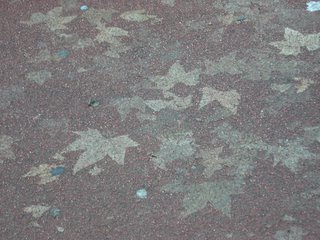
tis the season for skipping
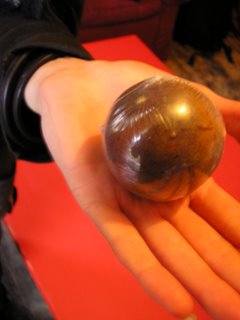
Kali found this.
It's another proof that things are seriously wrong.
In case you can't see, it's a passion fruit, packed in its own personal sealed nailon wrapping.
K: Don't they realize, it arealdy comes with its own packaging.
* * *
In season: mainly fruit.
Oh!!! (TM) Cucumbers (Spain)
Grapes (South Africa)
Bramley apples (UK, a skip full of boxes of them)
Strawberries (Egypt)
Organic Clementines (Turkey)
Yellow cherry tomatoes (Israel)
Wild Mushrooms (France; the season's nearly over)
No luxary items, but found a horseradish root. I'll make my grandma's style horseradish sauce, with beatroot. It's a Jewish Polish thing for Passover, and it's the wrong season - but the season is always wrong in the Wholesale Market. It's very simple to make:
Grate the horseradish root and the (cooked) beetroot, and mix. Add a bit of lemon/vinegar. And - if you have to - a bit of sugar.
Saturday, December 24, 2005
Last shift at the Bonnington Cafe
When I was growing up, I thought one day I'll be a university student and for some reason I assumed this would necessarily involve working part time in a restaurant/cafe as a waiter. I can't say I was exactly looking forward to it. Waitressing seemed to require both coordination and good social skills, engaging with strangers etc. Being both awkward and shy, I thought of it as a kind of intimidating test or challenge. Yet at the same time it did contain some promise of transformation.
Years went by. I started university and found job as a subtitles translator. It paid well, I got to improve my Arabic and English, and it did not invovle balnacing 5 plates on one hand. Then I worked in writing software in a start-up. This job required no motor abilities beyond the keyboard and social skills were a bonus which most employees lacked altogether. So it seemed that I would never get a chance to be a waiter. On the one hand I was relieved, on the other slightly disappointed.
But life sometimes take unexpected turns. And so I found myself wearing a sexy red checkered apron, in a vegeterian restaurant in London, taking orders etc.
The Bonnington is not a usual Cafe. It's a workers' cooperative; there's no landlord or boss. Each night is run by a separate crew, serving different cuisine. There's about 20-40 people involved, which makes it at the same time very anarchic and extremely rigid (come to the Cafe meetings and you'll see what I mean). On our night, we split the money equally between all of the workers.
It's been great fun. Since most of my labour is intellectual, reading or writing, every chance I have to do some physical work is much welcome. On extemely busy shifts I found myself just not thinking at all about anything for 6 hours: what a relief. Plus, there is something deeply rewarding about giving people food. Some kind of primordial pleasure.
I think I'll miss it.
Thursday, December 22, 2005
The Backstage Of Our Lives
As I found out, Recylcing Centre is a bit of a misnomer. We were asked to put the furniture through a giant machine which squashed it to death; it then gets burnt. Heaps of stuff were sorted according to type, and then taken elsewhere.
There was one huge container filled with elecrtic equipment. I climbed the metal stairway to the top of it, from which you would throw the defunct video/tv/streo on the heap. I remember looking with shock and amazement on this mountain of hi-fi. I had been finding appliances in the streets for some time, and I know that most cases it works; when it's broken, the fault is usually minor. There was a NAD amplifier right there at the very top. Should I just take it? I needed one for my room. As so often when I am faced with the sudden promise of freedom, I was not sure what to do. I hesitated for a few seconds; a huge lorry came and towed the container away. It was gone forever. I don't know what they do with hifi. Some elements are toxic. I doubt if they recycle any of it. One thing I knew for sure: no-one's going to even try to fix these things, or even test them.
I remember returning home feeling physically sick. We were supposed to do another run but I said I couldn't. The image of that mountain of discarded hifi kept coming into my mind. I felt like I had just been to a slaughterhouse. It was as if I had seen something which I wasn't supposed to see: as if I was taken to the backstage of a glamorous show, and found everything there miserable, sordid and vile.
Some people say you should eat meat only if you are able to kill an animal yourself; that if you couldn't, then you were a hypocrite. I tend to agree. As I see it, one should be willing to face the consequences of one's actions. I'd like to take this further: imagine each time you were buying new shoes, you would have to see, not pictures of models and sport stars, but the 16 year old indonesian girl who made them. That each time you boarded an airplane, you would be shown the amounts of fuel that your flight will use. That each time you had a drink in a club, you would get a glimpse of the guy washing the dishes in the kitchen for less the minimum wage. That each time you took the rubbish out, you would see the landfill where it goes. Imagine you had to come face-to-face, on a daily basis, with the consequences of the way you live. Surely it would be unbearable.
This is one reason packaging is so important for the way we live. The horrible, boring facts (socially, enviromentally) are constantly hidden behind a shining wrapping. We are kept safe from the real price of it all. We should never be allowed to see the backstage: some of us might not take it very well. It might prove too disconcerting. It might lead us to serious doubts.
The wholesale market, where I go every week, provides such experience. It is an industrial wasteland, quite literally. It is a desert of concrete. It is devoid of any of the joys which the word market brings to mind. It is the reality behind the supermarket shelf. And yeah, it's food for free.
* * *
Today at the market:
Italian fruit season! with organic clementines, kiwis and pink grapefruits (my favourite fruit on earth... after figs); non organic pears
Sicilian courgettes
Leeks, kale
British apples
Wednesday, December 21, 2005
a london day
Physical contact is very rare here. Certainly in the street. People would do their best not to touch eachother. British manners are all about that.
On both sides of the bridge, colours are dull and grey. But it is an exception. This automn has been crisp and sharp in colour, especially on Waterloo: the National Theatre in purple, the trees in blue, the Eye all red, the river deep and moving. It's been edgy.
* * *
That evening, in Soho, with S, C and A, at the Humous Bar. (This place is straight out of Tel-Aviv. But boy they try to hide their Israeliness. The humous's with Foul - broadbeans - is excellent).
I always get totally disorientated in Soho. Usually I have a good grasp on directions and my surrounding, I know my way in London. But once I step into Soho I become a tourist again. I can't tell north from south; it's alien territory.
We tried to go to the only bar we know there - the Swedish Garlic and Shots, which offers beer with garlic, a formidable combination. The back yard is the coziest place in London; downstairs is heavy metal kingdom, all patrons pierced and tattooed, and you can't see much through the cigarette smoke. Way too hard core for minks. The back yard was packed, of course; we retreated. The sign on the door says:
CASH IS THE KING
* * *
We settled for the coffee place on the corner of Old Compton Street, where the rickshaw riders hang out. D was there, sitting in his rickshaw, on the other side of the road reading a book, obviously wasn't looking very hard for customers.
D came to our housewarming-wedding party at Limehouse, two years ago, with a bunch of other merry rickshawriders. He was wearing a 118 shirt, and kept saying he's looking for 'non-lesbian pussy'. For a goodbye present, he pissed on our neighbours' front garden.
We didn't really like him after that.
"He was just drunk" said Michael. "He doesn't normally behave like this".
Last year on Christmas day we had a nice hanging out in our living room in Hallelujah Villas. Made dinner watched moves played music and just talked. D came with a few other riders. I was of course suspicious but this time he was very sweet; he even washed all the dishes, always a good point with me, and there were lots of dishes.
So we're even. But I didn't feel like saying hi last night.
It was Soho: people walking past were saying
"She's totally drunk: and she's got a pedal push bike. I mean, lucy, you're drunk".
A woman to a man: "She was talking to you, and looking at me the whole evening. I mean the chick of it".
Obscure visual sign of the week (11)
Sonic Booms in Gaza
Anyway - please read Laila al-Haddad last postings about the sonic booms above Gaza. It's the latest Israeli retalliation policy - flying about Gaza to make sonic booms to scare the population. It is much much worse than it sounds: the planes must be flying very low, and the results are - acording to Laila - deafening and nerve-wrecking to say the least.
Saturday, December 17, 2005
I've taken the tube so rarely in my three years in London that it still feels like going abroad. Mainly the smell, this very unique underground aroma (each underground has its own smell: the metro is really different). But today I couldn't smell anything, so it didn't really work. It just felt: blinded by florescent lights, alienated (not a single word said in the carriage), sad. And the noise, the high-pitch scream of the train meeting the lines, it makes me so depressed and tired.
Pimlico: the next station is Pimlico. Alight here for the Tate Gallery.
The lady from the announcment system seems to suppose that everybody's a good middle class tourist doing London's sights. And anyway, if you wanted the Tate, you could have gone in Vauxhall, and walk on the Bridge...
Next station is Green Park: change here for the Jubilee and Piccadilly Lines; alight here for Buckingham Palace.
Or maybe you're the Queen, and you need someone to remind you where you get off.
* * *
The BL was almost empty, and very quiet. A notice in the entrance to the reading room declared that from January 2006 pens will be outlawed, and only pencils could be used. Too many people have been making notes in books.
Ah the exhilirating, dramatic life of a phd student. Livind on the Edge.
Coming back, the tube was packed. Started to get suicide bombing premonitions. Tried hard not to look at people suspciusly. Realized that my own wooly hat and shawl and bag make me a likely suspect, and wondered if anybody is going to pull a gun out. Just wanted to get out of there.
Next Station is Vauxhall: alight here for the Fag hill, the Portugese shops, the Paradise Gardens, the Bonnington Cafe, and your very temporary Home.
Tuesday, December 13, 2005
sick mink
Suad Amiry's Sharon and my Mother in Law. Life in occupied Ramallah. Extremely hillarious, candid and poingant.
Iqbal Ahmed's Sorrows of the Moon. Beutiful and subtle journey through London - the real London, of minimum wage, annyoing postoffice ladies and alienation - not the fake hyped London of Time Out.
Sunday, December 11, 2005
Extracurricular Mink
- people arriving in black cabs
- girls with handbags
- only two people with dreadlocks
- posh cheese (stilton and goat) and chicken wings (!!?) as hors doeuvres
- good live music
(*) UCL attractions: two years ago I heard the curator of the Petrie Museum, Dr. Quirke, give a mesmerising paper on ancient Egyptian cities, gender and power. It involved a poem about the King sneaking at night through a mudbrick town, to reach the house of his general lover. Been wanting to visit the museum ever since.

To get to the Petrie Museum of Egyptian Archaelogy, you need to jump the UCL library gates, go through three doors which seem to be leading nowhere; once you're there, you'll need a torch to see the exhibits (the museum staff will provide one) because it's so dark. The display is amassed in endless rows of glass cabinets, some of it leading into the blocked Fire Escape. They will modernize it in a few years and move it to a new building (to be called the UCL 'Panopticon' - milking on the Jeremy Bentham connection) - so go before it's normal and boring. It's free.
As for Jeremy Bentham, who Marx called "a genius by way of bourgeois stupidity" and a "purely English phenomenon" - yes, he's there, in his 'auto-icon', stuffed, or rather, preserved for posterity. My favourite bit is seeing the guard put him to sleep everyday on 5pm. I'm rarely there to see it though. The clothes and bones inside are his, the face not (unfortunately something went wrong and they have to use a wax mask).
Thursday, December 08, 2005
Market Diaries
Sometimes, on a good day - when my panniers are full with fruit and veg, and a box on top of that, of exotic fruits and organic produce - I feel like saying to people: look! You can get all this for free! There's no reason to go into the supermarket. No need to pay for anything. It's just five minutes walk from here, and (usually) no one will stop you! It's all getting thrown away!
But I don't say anything. Partly because in London, when strangers approach you on the street, they're almost always crazy/want money(that's my experience at least).
But also I know there's no point. People are shocked by the idea of taking food from the rubbish. Ostensibly, it's about hygiene and food safety. But the food is perfectly fine - really, it could be on the supermarket shelves (so why is it thrown away? Too much ordered, too close to use-by date...). It's as hygienic as the stuff you buy.
The real reason is shame - eating wasted food is something poor and desperate people do. Most people will agree that throwing good food away is criminal, but as for taking it themselves...
When I first started skipping I was over-self-conscious. Opening a bin-liner in a main street for the first time, in broad daylight, felt like transgressing some basic rule; 'thou shall not touch the rubbish for it is filthy'. And I was sure everybody were looking at me. At times I wondered: what if somebody from college sees me? Or a friend of my parents, visiting London? But I found that no-one cared, no-one was looking. And when they did, they would avert their eyes; it's unpleasant to see someone looking through the rubbish. Very quickly I lost my sense of shame.
The level of waste in London is astronomical - you could feed another huge city with it; the ones who should feel shame are the people who throw out this food, not the people who take it. But that's a bit hard to stomach I guess.
* * *
Yesterday in the Market, in season:
Tomato day (from Holland, Morocco, Canary Islands) - and tons of Iceberg lettuce (Spain)
As Blue once said on Iceberg: it has the nutritional value of cardboard, and the only good thing about it is that it can last for weeks. (Good for supermarkets, that is).
Also:
asparagus (Peru)
Pok Choi
Wild Mushrooms (fresh shitaki, great in an omelet)
Pears
Butternut Squash
Wednesday, December 07, 2005
Lonely Gloves
Later it became an idea for a website. Find your perfect matching glove. It would have pictures of them all (like dating websites, or police criminal shoots). Like many of Michael's ideas - the robot-roller-blading disco benefit, or the special dish rack he was planning to build- this one didn't materialize. He just never got round to it. But he did collect the lonely gloves, and put them on his wall, above his desk.
Blu, on the other hand, collected them for more practical reasons. You always lose gloves, she said, so it's better to have some spare ones. So she picked this glove off the road, and when she ended up putting her hand into it (four months later), she found a hundred pounds note.
Funny, I just realized it's Michael's cycling winter-gloves I'm using. He left them behind in Honor Oak in one of the broken toilets. Someone was supposed to pick his stuff up, but it never happened, and when eviction came I appropriated them.
But then again, he doesn't really need them in Namibia.
Monday, December 05, 2005
To make sure I don't spend whatever time I have left in London at libraries and archives, I decided to make a list. Things to see. Places I've always planned to go but... places I always go to. a Provisional List.
1. Have lunch/dinner at the top floor at the Elephant and Castle.
2. Visit the Petrie Museum and photograph Jeremy Bentham
3. Climb the Monument
4. Go on the annual pilgramige to W.Martyn's Tea&Coffee shop, Moswell Hill (perhaps with a visit to the Highgate cemetry)
5. Go down to the river bank (just below MI6)
6. Walk round the Oval
7. visit Clifton Mansions (you can never tell if how long they'll be there)
8. Go to a squat party
9. Nunnhead cemetry
10. Walk the Chenyne Walk, Chelsea
Friday, December 02, 2005
the truth is out there, in Vauxhall

They appear without warning, and position themselves along South Lambeth Road and Vauxhall Cross. Mostly men, they have about them an air of anxiety and confusion, the kind typical of newcomers to London. The reports they send on their radios are difficult to understand, and the gadgets they use strange and unfamiliar. A sleek , smug and relaxed man goes between them and checks on them. S ventured to ask one of them what they were doing, and he said: Data collection.
I think it has something to do with the British Interplanetary Society. It seems that extra-gallactic contact has been established; for a brief moment, the back yard gates were open and I could see the Society members practicing something. I wonder if they might be coming soon.
Wednesday, November 30, 2005
Species of the Wholesale Market: a Zoology
* The rubbish trucks - huge beasts, real mammoths. They rule the market. Roaming the three main avenues, they suddenly charge at the one big skips, lift it up in the air, and swsallow its contents whole. It has a huge belly, and anything that goes into it is gone forever (to a landfill). After devouring the waste, they put the empty dumpster back on the ground , make a roaring belch, and move on. Don't mess with these creatures: they're dangerous when they're angry.
* New Covent Garden Market Authority people - these creatures drive in white vans with their genus printed on it. They are harmeless most of the time, but every once in a while become aggressive and territorial; they hunt the skippers (see below) and the Chinese ladies (ditto) and throw them out of the market. Observations so far (three years of field research) have not established a pattern in this behaviour, and it might be connected to the Thames tide and the position of the constellations. In their aggresive mode, they usually wear their security captain hats.
* Delivery vans - coming in, going out, always driving very fast. Mostly herbivores.
* Fork lifts - they drive around warehouses and the skips frantically, moving palletes, boxes of fruit and veg, and various rubbish. These species make a beeping noise when they reverse; their behaviour is erratic and they can be dangerous to pedestrians and cyclists, since they move so quickly.
* Market workers - from the suit-and-tie office people, through the warehouses workers, to the cleaners. Most of the time they ignore the people who skip in the market. Some are nice, and offer you good stuff that they're about to throw. Others can be mean, esp. to the Chinese ladies (see below). Other times they ask you: why are you coming here to take food from the rubbish? why don't you get a job?
* Skippers (latin name, Dumpsterus Diverus) - mostly scruffy looking squatters, punks and minks, who move around the market with bicycles, and collect wasted fruit and veg into their red bellies on their bikes (aka panniers). They do not operate in packs - usually come as one or two - but they seem to belong to some bigger clans, as they usually exchange information about good locations of food (similar behavoiur has been observed in bees).
* Chinese Ladies - they come on foot in groups of 2-4 to collect the wasted fruit and veg from the floor and around the skips, and they can be seen in the market most of the day. They are sometimes abused by the other animals (see market workers, Authority people), possibly on racist ground.
[p.s: I thought of making this into a computer game: the player would be a skipper, the aim being to collect as much food as possible before it is gone. More points for exotic fruit and veg (they travel longer to get to the market). A complicated algorithm would imitate the erratic and random behaviour of all the elements of the market (nice/nasty, lots of food/no food, etc).]
* * *
Today at the market, in season:
Christmas Trees!
Frozen Lobsters, Canada (no i didn't take any)
Passion fruits, Egypt
Figs, Israel
Melon, Brazil
Spinach, France
Cherry tomatoes, Belgium
Bananas, Domincan Republic
Green Peppers, Spain
Clemetines, Turkey
Green Beans, Maroco
Monday, November 28, 2005
Saturday, November 26, 2005
Obituary: My bike, 2000-2005
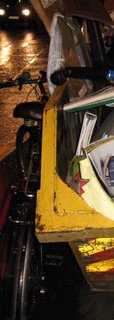 Last Friday, as I was finishing my weekly shift at the food Co-Op, I went outside to bring the shop sign inside. Then I noticed my bike had disappeared. I forced myself to look again, but it definitely wasn't where I locked it. It took a few seconds before it really hit me. I felt gutted.
Last Friday, as I was finishing my weekly shift at the food Co-Op, I went outside to bring the shop sign inside. Then I noticed my bike had disappeared. I forced myself to look again, but it definitely wasn't where I locked it. It took a few seconds before it really hit me. I felt gutted.I soon realized that my keys were also missing. So I must have dropped my set of keys near the bike, and the kids simply used them to open the lock and cycle away (nothing remained behind, not even the usual witness of a murdered lock). I felt exceptionally stupid: had no one to blame but myself.
A bike is just an object, an earthly possession, a vehicle. It can be replaced, its loss is not a tragedy. Yet for me, my bike was also one of the few threads connecting my life in Jerusalem to my life in London: between my previous self, a straight kind-of-kid with conenventional politics, and my London incarnation as an anrachish-scholarly-squatter, urban scavenging mink. I was very attached to it. I decided to write about it here.
* * *
I bought it in a small bike shop in an ugly, marble floored Jerusalem mall, on a Saturday night. The shop owner was called Dov, a very Israeli name, but he had a strong American accent, a silver coloured short beard, and a 1960s music poster on the wall (joan baez, I think). I guessed he was an ex-hippie. It was obvious that he loved bikes. It was equally obvious he wasn't happy being there on Saturday night.
The bike, a hybrid, green GT (Outpost Trail) was on offer, and it had suspension on the front wheel. As I was getting some accessories for it, Dov received a phone call from his wife, saying his daughter has just given birth. He was very happy.
'My first grandson' he told me. He gave me a light reflector for free.
* * *
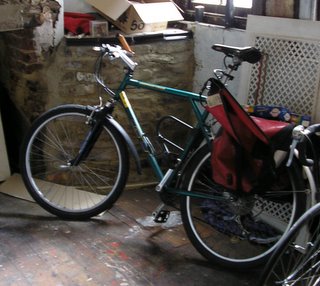 I was working at a software company in an industrial park in Jerusalem at the time. It was just at the end of the dot.com bubble; people were still talking about getting rich. Most people at work had a brand new car, from leasing agencies. They lived in an air-conditioned world, from the car, through the lift, to the company open-desk offices; talked about ski-holidays and pretended to be living in Palo Alto California.
I was working at a software company in an industrial park in Jerusalem at the time. It was just at the end of the dot.com bubble; people were still talking about getting rich. Most people at work had a brand new car, from leasing agencies. They lived in an air-conditioned world, from the car, through the lift, to the company open-desk offices; talked about ski-holidays and pretended to be living in Palo Alto California.After my 1976 VW beetle was stolen, I started cycling to work. I would go through the Sepharadic neighbourhood of the Shuk, the Fruit and Veg market,, and then through the poor ultra-orthodox neighbourhoods. Getting to work was 15 minutes downhill; coming back, after 11 hours of work, was 40 minutes uphill. But I didn't care, because I was going home. I used to cycle through one alleyway where born-again Jews were praying the evening prayer outside a synagogue. 'Come on, stop and join us' they would say. 'Hmm, don't think so, thanks'.
All through my programming days, I was trying to keep sane, to hold my grip on reality in the sickly virtual world of money and code, of florescent lights and American corporate speech. Cycling helped me: it was sweaty and sweet, hard and satisfying.
* * *
When S and I moved to London, getting bike was one of the first things I did. For a while I was using Nasim's watermelon-coloured bike (red, green and black stripes). And then a crappy Raleigh bike. When I realized I was going to stay in London for a few years, I decided to bring my Jerusalem bike over. On my next visit home, I asked it back from my brother. It was sitting in his balcony in Tel Aviv.
Shame, he said, I just fixed a flat tyre.
Tel Aviv, London Gatwick, Blackfriars, Tower Bridge, and on the DLR to Limehouse. It felt like a new beginning. We were getting evicted in five weeks.
* * *
In my life in London, a bike is not just a means of transport. It's a means of survival. It's how I brought home everything I would find on the streets: woolly blankets, shelves, electric heaters, laser printers, rags, clothes... you can carry so much on a bike. And of course, food. Fruit and veg from the market; packed sushi and sandwiches I'd skip on the way home; sacks of organic bread, thrown away by posh restaurants; and stuff I bought from the Co-Op, like 25 kg sacks of oats, for me and my housemates (at one point there were 23 of them).
It took me wherever I wanted to go in London: to college, to the British Library, to cinemas and squat parties. It waited for me patiently until I was ready to go back home. It was my steadfast green horse, day and night, rain or sunshine. No need to wait for the bus, no money spent on the tube. My faithful bike helped me come to terms with London; it helped me feel safe to roam and expore the city; it made me feel at home, even when I was getting evicted and had nowhere to go.
* * *
I'd like to say that I treated it well. But that would be a lie. Unfortunately I always had friends/housemates who were rickshaw riders or bike geeks and could fix it for me when I needed, so I was lazy about taking care of it myself. Still, I cleaned it and oiled it every once in a while. The last time was just two weeks ago.
Also, I didn't go on long travels with it. Didn't take it to exotic places. One day trip in Norfolk, that's all. I feel a bit bad; but then, it travelled all across South London and the East End.
I went to the stolen bike market in Brick Lane on Sunday, and to local bike shops around the Elephant, but couldn't see it anywhere. I hope it wasn't slaughtered for its parts. And somehow I hope I'd still see it someday. Not too many GT bikes in London.
Thursday, November 24, 2005
Brilliant Ideas for a Perfect Weekend
Immerse yourself in the (bustling) markets, visit the holy sites, and then follow the Baedeker guidebook for a relaxing afternoon stroll:
"From Yafa Gate we may pay a visit to the Lepers Hospital. We descend the second street to the left, and reach in 5 min. a Greek cafe shaded by a large tree on the right. We pass some houses and tombs on the right, beyond which we ascend three steps, pass through an iron door, and traverse the garden of the hospital. This establishment was fitted up in 1867, and is presided over by a German custodian. The disease is not at all infectious, but the seclusion of the patients is necessary to prevent them from marrying and thus perpetuating the evil. Hideously repulsive leprous beggars are still met with on the Yafa road, as many of them, particularly the Jews, have a greate repugnance to being lodged in the hospital; but it is hoped that most of them will in time be thus secluded, as there is no other effectual mode of eradicating this loathsome and generally incurable disease. The malady being hereditary, the children of leprous persons are almost always attacked with it in later life. In 1873 there were thirteen patients in the hospital.
The patients in this hospital present a spectacle of human misery in one of its most frightful phases, and the visitor will not fail to sympathise with the benevolent efforts that are being made to alleviate their suffering to the utmost, and to prevent the farther spread of the scourge.
Karl Baedeker, Jerusalem and its Surrounding, Leipzig 1873.
Wednesday, November 23, 2005
please bear with us
sorry about this, i know the colour scheme is dreadful; will work on it in the next few days,
Monday, November 21, 2005
Obscure Visual Sign of the Week (7)
Friday, November 18, 2005
The extrordinary adventures of H.H.Shaw in Jerusalem, 1922
[An exchange of letters between the British Military governor of Jerusalem, and HM Consul in Port Said]
Part 1:
To: H.M. Consul, Port Said
Sir,
I am sending down under escort of a British officer of the Palestine Police Mr H.H Shaw who is being sent away from
Subject: - Mr. H.H. Shaw
Mr Henry Shaw lived in
Part 2:
British Councul,
7.3.22
Sir,
I have the honour to forward for your information copies of correspondence between this office and the Governor of Jerusalem on the subject of Mr. H.H Shaw who was expelled from Jerusaelm and sent to me under escort.
I did not gather that Mr Shaw’s offence was any greater than having threatened to “knock someone’s profanely qualified face in” when both parties were somewhat under the influence of liquor. In any case the procedure of his expulsion seemed to me most irregular. Mr Shaw struck me as an amiable and somewhat vacuous young man, but by no means vicious and very far from criminal. He reported to me that some of his effects were seized by order of the Governor of Jerusalem and sold to pay the expenses of his expulsion. He was made to pay his own railway fare, the balanced being handed over to his excort to turn over to me, and I then returned it to Mr Shaw.
Mr Shaw Cabled home to his parents for money to go home with and has now left
Thursday, November 17, 2005
Wednesday, November 16, 2005
Notes from the Market
Like anyone growing up in an urban, western/ized envionement, you used to get fruit and veg from the supermarket, or the market, or the corner shop. You bought things according to what was necessary (for a dish you wanted to make); according to how much things cost, and how much money you had. According to what was in season. Sometimes you would see something exciting and splurge. But most often you would go with a list, on a note or in your head.
The Wholesale Market is different: you get what you find, in the skips, in crates next to the skips, in bins, on the floor. Since it's never possible to tell what you will find, planning is useless. Sometimes you think of yourself as a postmodern hunter-gatherer; yes, skipping is something between hunting and gathering, since it's not just about collecting food, but also about avoiding the security, knowing where to look and when.
Usually you find too much. Crates of pears, mountains of parsley, boxes of pink grapefruit. They can be expensive or cheap items, it doesn't matter, because they are all thrown away. You get excited: you want to take as much as you can. You want more. You were taught never to waste food; you were brought up to consume carefuly, because money doesn't grow on trees. But here you are overwhelmed with abundance, which will soon be sucked by the rubbish truck and gone forever. So take it, quick, now. The greed-god is hungry, and it's all for free.
Taking too much is unwise. Lingering in the Market is risky; the security may find you and take everything that you had found. Overloading your bike is dangerous. And what are you going to do with all these fruit and veg? you promise to yourself to preserve them as pickle, jam and conserves, but know you don't have time, most likely they will simply rot.
The Market - and skipping in general - is a challenge in greed, an excercise. Can you forget the world of money and exchange, and take stuff according to what you really need and want?
* * *
In season today: yellow peppers, tomatoes, artichokes, plastic packed baby spinach leaves, basil, parsley, mango, raspberries, pears, watermelons.
Countries of origin: Brazil, Spain, England
I didn't take the watermelons, although I really like them. It seems WRONG to eat watermelon in England, in Novmeber. The whole point about watermelons are that they are cooling and refreshing. No need for coolness here at the moment.
Saturday, November 12, 2005
Recent Highlights

2. 4th November(a) Guy Fawks day, going back to my reqautted old squat and finding my old room thoroughly polishized /punkified. The uneasy haunted passing through the spaces once painfully inhibited. So much is just the same: the bikes cramped in the hall. The dread of art-toss-housemates (only his bike was there). A cycle ride there, up the Rye, to the sounds of London's philharmonic fireworks orchestra; and back, when it's all dying down, madness over, time for winter. Early November is a turning point.

And in between: a bonfire, in the back yard of the Villas; we burnt the deck-chairs Michael skipped last year.
3. 4th of November(b) all the crazy bangs, sometimes- not too often - take me back to that night, in Tel Aviv, when real fires were shot, shortly after I left the square. It's been ten years now. Words I would use in this context: disillusionment, nostalgia, loss. Never really admired Rabin, but in some strange way I liked him: he was rude, impatient, real. The years since have made me very critical about his policies, and about the Oslo process (a neo-liberal peace, a ne0liberal disaster). But at the time, it felt like regicide, like petricide. In London, the fireworks remind me how there's nothing nice or entertaining about the sound of expolsions.
4. Dirthole pl
 aying in Whitechappel, next door to where my liver was recently chopped. They kicked ass.
aying in Whitechappel, next door to where my liver was recently chopped. They kicked ass.
Friday at the Market

In season:
Limes (Mexico, Brazil)
Rocket (Israel)
Beautiful™ Figs (Turkey)
Custard apple, aka Anona (Granada)
Papayas (Brazil)
Spring Onions (Egypt)
Parsnip (England)
Broccoly (Spain)
Courgettes, Cauliflower (Country of origin unknown)
All made their way, across mountains, oceans and highways to South London, where they are gracefully chucked in the bin.
Before I started going to the Wholesale Fruit and Veg Market, the terms globalizaion, or free market, conveyed for me a sense of a levelled world, in which transport, communication and commerce go in all directions, to reach all corners of the world, and bind them into a web of constant buzz and flow.
During my repeated visits to the market, I soon realized that like any spider web, the globalized web has its centrepoints; points of power and control. Ultimately, a web is a way to make dinner for one party; somebody is doing the eating, while others are being eaten. The system has its metropolitans and the provinces, its rulers and ruled. It is about hierarchy: the flow is going everywhere, from everywhere, it's frantic and crazy. But there is a clear and one-sided logic to it all. Look in the bins atthe Wholesale Market, and you will understand it: No one in Egypt and Mexico will be eating parsnips for Christmas (they don't know what they're missing).
With figs and cusard apples, I find it difficult enough to get them home unsquashed; importing them from the other side of the world - just seems so stupid. No wonder so much is thrown out. Such levels of excess and waste make sense only in terms of crude profit (figs are sold 2 for a pound).
One day, of course, everybody will be rich and happy; after we win the War on Terror, and we'll have peace and capitalism, everybody will have money to import whatever they want. And so the good people of Granda could import english turnips - just to chuck them in the bin.
Friday, November 11, 2005
Obscure visual sign of the week (6)
Tuesday, November 08, 2005
labotomy is fun
"We saw that computers, connected together, had the capacity
to create an environment which human beings could and did inhabit ...
The people who share this awareness are natives of the future.
People who have a hard time with it may always be immigrants."
(J.P.Barlow, a hippie geek, addressing CIA conference, 1992).
How optimistic: that there can be such a thing, natives of the future.
Where we are, and more so where we're going, we are always immigrants.
Friday, November 04, 2005
Obscure visual sign of the week (5)
Wednesday, November 02, 2005
At the Market

Wild Mushrooms (this week I got just in time to save some). Imported by air - don't know from which country.
Pears - Italian
Grapes
Bananas
Herbs - Israeli mint, Essex organic basil
Halloween pumpkin s
oranges
Speciality items: okra (first time I see it in the market! I love it. Alas too manky), curry leaves
I was chucked out by the security, went back, got chucked again when i was picking stuff from the floor. Second time i got a bit bummed. The security car followed me to make sure i get out of the market, so I cycled very very slowly. It felt a bit like VIP police escort. I tried to enjoy it.
mink's market skipping strategies (a) never go into the skips. Too dangerous, and it pisses the market workers off (b) don't argue with the guards. what's the point? The guards are protecting the criminal waste of fresh fruit and veg. It's their job to make sure tons of fruit and veg go to a landfill, every day. Of course it doesn't make sense. I'm sure they know it. But their job is the lawful and logical extension of the system of waste in which we live, the fossil-fueled free-trading global suicidal extravaganza


Tuesday, November 01, 2005
Reaching for the future
two men, not far from Euston.
A: I should say I'm am quite concerned by this.
B: Of course.
A: How long do you think it would take me to reach my toes?
B: How old are you?
A: Fifty four.
B: Then I would say three months.
A: Only three months? that's extrordinary.
B: It's easier than you think.
A: Even six months of daily practice would seem short to me.
Monday, October 31, 2005
Imperial War Museum
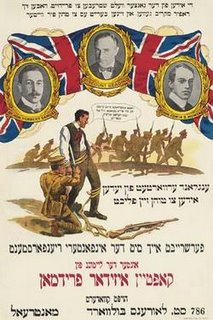 He was right, nothing was directly relevant. But I found a World War I British recruitment poster in Yiddish. A soldier can be seen cutting the ties of a Jew, who is quoted saying ‘
He was right, nothing was directly relevant. But I found a World War I British recruitment poster in Yiddish. A soldier can be seen cutting the ties of a Jew, who is quoted saying ‘
[The poster is probably pre Balfour declaration, Zionist sentiments are not used here]
Later I had a look at the contemporary section. Strange, uneasy mixture: I found the ‘No War on
The logo was especially disturbing: the occupying forces chose the image of a handshake – between an Iraqi hand (dark skinned, under an Iraqi flag) and a white hand, beneath the acronyms of MND (Multi-NAtional something) / South East. Of course, no American or British flags were shown on the poster – after all, this was a ‘Coalition War’, not a US/UK invasion.
The need to mask Imperial power is not new in the
But this 21st century propaganda had nothing sophisticated about it. It was as lame as this whole neo-conservative adventure-horror trip. Hiding behind meaningless acronyms, or a logo of a ‘handshake’, can't really fool anyone.
Sunday, October 30, 2005
October Critical Mass

1151 London cyclists showed up to this month critical mass (cz counted)
the police threatened to ban the event, but they didn't; because so many people showed up? because they felt nice that warm October evening? who knows.
Critical mass pics always fail to capture the sense of empowerment and solidarity which accompanies this mass aimless drifting through central London. The buz is druglike.

Highlight was twenty minutes cycle-jamming Parliament square, heart of the paranoid age 'demonstrations exclusion zone'. You won't find any mention on the Guardian or the BBC; but on indymedia you can find reports, videos and a scary green monster.
Tuesday, October 25, 2005
Longing for the Suburbs?
 It’s not cold yet. The sun is plunging like your coffee maker in the morning, staying low – ho – low. Soon time will be up for daylight saviours. And plane trees, so triumphant, shed their leaves; in a month, the poplars will go bare as sardines after dinner. The poplars: their small leaves will rot and disappear so quickly, before real winter even starts: January. While the plane trees, carry on, carry on, their leaves big, dry, like chopped off giant hands. They linger, all the way to April.
It’s not cold yet. The sun is plunging like your coffee maker in the morning, staying low – ho – low. Soon time will be up for daylight saviours. And plane trees, so triumphant, shed their leaves; in a month, the poplars will go bare as sardines after dinner. The poplars: their small leaves will rot and disappear so quickly, before real winter even starts: January. While the plane trees, carry on, carry on, their leaves big, dry, like chopped off giant hands. They linger, all the way to April. But not cold, not yet; November round the corner, and I can still cycle without gloves. Damp, and dark, and disconcerting: yes. But cold, no. not yet. Last week I could say something silly, and clichéic, like I love
But not cold, not yet; November round the corner, and I can still cycle without gloves. Damp, and dark, and disconcerting: yes. But cold, no. not yet. Last week I could say something silly, and clichéic, like I love
Monday, October 17, 2005
H5N1
anyway. escape is probably wise. Something inside me wants to stay and see this metropolis melt down, and blog it live, but who knows if i'll survive.
So.. evactuation. where to? Australia seems a good option.
[scene one: long queues in the rain in front of the Australia House, the Strand, London.
The woman, pleading with heavy Australian accent: but i am an australian citizen. My husband and kids are in Jalong.
Televised Official: I'm sorry but as you know since the 19th of November we do not allow entry from infected countries. There is not exception unfortunately.
woman, weeping: but i just want to get home.
Official: we had to take this measure to protect your family. No one can be allowed to enter. It will not be safe for your family.
Woman: I have my health check here
Official: I'm sorry
cut]
so it's better to get there before they impose a quarantine on the rest of the world.
We had a look on the Australian immigration website. Apparently they welcome 'genuine tourists'.
I think i'll need to to get my look together.
Saturday, October 15, 2005
what is failure
but you should definitely try this one.
1.) go to www.google.com
2.) type in 'failure'
3.) press the I'm feeling lucky button (instead of the google search one)
google will probably fix this so share the pleasure before they do
Obscure visual sign of the week (4)
Friday, October 14, 2005
the camp dervish at the Bonnington Cafe
Me and N looked at each other, and said simultaneously: ‘I’d rather keep reading, sorry’.
‘What are you reading?’ said the man, excited. There was something camp about him, and he moved like a water buffalo.
N: just a Dona Tart novel.
Mink: the memoirs of the first British Governor of Jerusalem.
The man sat down at our table, uninvited, his eyes opening: ‘fascinating! I’m so interested in colonial history. Because we are all subjugated by white Colonialism. I’m from India, you know.’
He looked Indian, perhaps, but had a mild Yorkshire accent. He continued: ‘but as Marcos says, we are all Indians.’
N: you mean Zapatista Marcus?
Camp man: obviously. I’m just passing through here in London... but I find it impossible to stay. Such high level of repression. The highest level of repression in the world.
N: hmmm.. dunno about that... have you been to the US lately?
Man: it’s worse here, I’m sure. Everybody you talk with on the street interrogates you, as if they worked for the MI5. It’s because they’re all sexually repressed, they cannot express themselves. It’s like what Foucault says in the History of Sexuality. There is no freedom here. And we Sufis believe you must free yourself of everything. Even of god. Allah is just a sound for us. It doesn’t mean anything.
N: wait a minute... what kind of Sufi are you?
Man: I’m a dervish, actually.
N: I mean, you can’t speak for all Sufis. You can’t lump everybody together. Maybe your Order is different... do you have a sheikh?
(N has recently become sufi himself)
Man: No, we dervishes believe in leading by obeying, like subcomandente Marcos. That’s why Sufism is can be seen as embodying the principles of the EZLN.
N (getting a bit impatient): how can you say that Sufism follows Zapatista principles, when Sufis came much before?
Man: Before, after, it doesn’t matter. You know, it’s like the Muslim story about Jesus. We call him Isha (sic). We believe he died for us...
N: but according to the Koran Jesus didn’t die.
Man: but there are many stories, not just one need to be written. That’s why they had the Fatwa for Rushdie: because he opened many stories in the Koran, while they wanted just the one written story. Writing corrupts speech, because it forces one version. It makes story into propaganda. Read Chomsky. He says it all.
I begun to lose interest and went back to my book. But the camp dervish excited loud voice made it difficult.
Man: I want to overcome this Western Dualism. There is no self. I want to awaken us to the other.
N: but by ‘awakening to the other’ you’re just accepting the self/other dichotomy, not overcoming it.
Man: I’ll rephrase it: awaken with the other. See the other, you’ll see yourself.
N: but that’s so obvious. Everybody knows that.
Man: of course. I tell you only what you always already know, what is always already obvious.
They continued talking for a while, until they came to the subject of Chiruki astronomy, at which point N exploded.
N: you don’t know shit.
Man: fuck you... with all respect. I don’t think you should call yourself a Sufi. Can I have the bill?
Tuesday, October 11, 2005
Obscure visual sign of the week (3)
Saturday, October 08, 2005
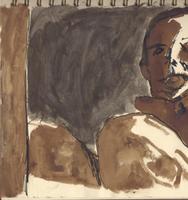
When you hear the tutor instructing to prepare for the last posture, Shavasna, relaxation, you feel as if you have won a well earned prize. The two hour practice has driven the clouds of anxiety from your mind, leaving behind almost a clear sky. But when you lie down, and lay your hands alongside your body, these troubling thoughts sneak back, one by one, dancing in the darkness of your closed eyelids. You try to keep them at bay, forcing your mind to focus on your breath. It is an ongoing struggle; when you succeed, it seems as if you disappear altogether for a brief moment, to a place of no thought, no consciousness, just a complete, and utter rest.
When you come back from these lapses, you are usually overcome with weariness; at times you see things, things that come from the dark, glimpses of nightmares. How this troubled journey can be considered relaxing, you do not know; yet when you hear the words commanding you back to the surface, and you slowly gather yourself and open your eyes, you feel revived, recovered, as it were, from the pains of being.

You close the co-op ten minutes early; you are by yourself today, and you do not want to stay behind too long. When you finish, the time is almost half past seven. Outside night had fallen; you wonder what time it gets dark nowdays – six? Half five? - the days disappear so quickly in October, it’s like watching a crashing airplane; soon it will get dark before four o’clock. You post the keys through the letterbox, as usual, and hear them make a sound as they hit the floor; only to realize you had left your water bottle inside the shop. Well, too late now.
As you unlock your bicycle, you notice three 16 old boys walking up the sidewalk, their pace cocky, their conversation loud. You can’t hear what they’re saying, but the music is unmistakeable, songs of inner-city bravado. It would be sensible to get out of their way, but you realize you don’t have enough time. Fortunately, the slightly dim neighbour from upstairs starts chatting to you through the window. You do not understand his sense of humour, but you are grateful, all the same. “Do you have jewels in there?” he asks, pointing at your bicycle panniers. “No, just lentils”. The boys have passed you; the neighbour says good night. You are about to get on the bike and cycle away, but you see the boys lingering not far, on the corner of the estate. They are up to something, their voices hissing with excitement; they light some sort of fire cracker and shoot it – at whom, you cannot tell – then they run away, laughing.
A moment later, a big commotion, and another pack of kids comes running from behind the corner, all swearing and shouting. There are about ten or twelve of them; it would be silly to try to cycle away now. They run towards you. “Where is he? Where’s he gone?” You are slow to reply; maybe you just don’t want to get involved. One of them grabs you by your shirt and shakes you, pushes you against the rubbish bin; another one takes something out of his pocket and waves it angrily in the air. You wonder if it’s a knife; your bicycle loses balance and tips over; you point towards the alley to where the first gang disappeared. The object in the boy’s hand now seems more like a mobile phone, though you’re still not sure. Shit, shit, they shout, where they gone, that way, where. The boy shakes you one more time, then lets go; the group loses its centre, wondering in all directions. Suddenly they are going, running, back to the estate. The last one to stay behind picks your bike from the floor. He turns his face to you, attempting to look hard; maybe he’s trying to say something. For a moment you think he’s about to try to get away with your bike. Strangely enough, you do not think about your notebook computer or your wages from last night at the Café – both are inside the bicycle panniers; it’s the prospect of losing the bike which terrifies you. You hold on to the bike; he then hands you the handlebars, in an awkward gesture, still keeping a tough face. Was he just trying to help? Or did he give up the idea because the bike was too heavy, loaded with two panniers?
Later, as you cycle home through the back streets, the moment of confrontation flashes back. Tonight could have been much worse, you know. That frustrated aggression could easily have found you as a target. Like anyone living in London, you have witnessed violence on the streets: a man chased down by a group of fifteen youngsters, brought to the floor and kicked all over his body; a man smashing a shop window in the middle of the day; a woman narrowly escaping from a violent man in a car; the aftermath of a shooting, a street away from your home. On those occasions, you chose to cycle away as quickly as possible, leaving it for others to deal with. But after three years of living in the poorer parts of
More troubling, you find, is your almost lethargic response to the situation; when the boy waved the object towards you, you stared at it numbly, apathetically, as if you were an observer, a bystander. You used to think of your dislocated slowness as something quaint; ‘you’re as slow as a florescent light switching on’ said Lily once. Now this slowness seems more like a dangerous fault. Now, your inability to act and react without calculation feels like a crippling disadvantage.
You had plans to go to the Ritzy to watch David Cronenberg’s new film, The History of Violence, but you decide to leave it for another day.
Monday, October 03, 2005
tughra
 An idea for a short story/novella: a fictive account of the life of Paul Wittek, a scholar of Ottoman History. The story will start in 1948, when Wittek returns to Europe which he had fled before the war. He travels across the continent, trying to retrieve the archive that he had had to leave behind, and to pick the pieces of his former life; it will end in 1950, with the publication of the second part of his article on the Ottoman Tughra in the Journal Byzantion, and before he is ready to depart the continent and return – this time for good – to London.
An idea for a short story/novella: a fictive account of the life of Paul Wittek, a scholar of Ottoman History. The story will start in 1948, when Wittek returns to Europe which he had fled before the war. He travels across the continent, trying to retrieve the archive that he had had to leave behind, and to pick the pieces of his former life; it will end in 1950, with the publication of the second part of his article on the Ottoman Tughra in the Journal Byzantion, and before he is ready to depart the continent and return – this time for good – to London.
Saturday, October 01, 2005
Thursday, September 29, 2005
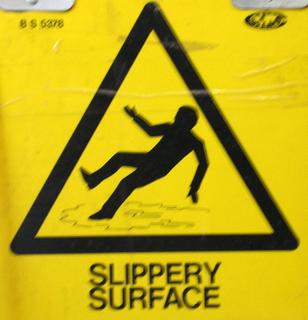
The person sitting next to me is doing some internet webcam chat on a laptop. Chewing gum in place. Earphones on. Facial expression of intense pleasure. Constant silent giggling. Wireless is bliss.
I'm at college, 4th floor computer room. Managed to lose my wallet today so i don't have my special magnetic card which gives access to the postgraduate study room, and I have to sit with the undergrad plebs.
Very ungainly mood this evening
Humanity? Just say no
There's a lot of new academic year axcitment in the air, lots of disorientated new student moving in circles of orienataion tours. i'm starting to realize i'm not enjoying this so much
having a highly ambivalent and troubled relatioship with academia is a trope, a topos, a clicheic state of affairs, which i guess 90 percent of postgrad research students share. Acadmeia is a strange world indeed so no surprise there. Only in conferences or seminars i realize how alien I feel there.
So, what is your research about?
Hmmm... very interseting.
And what about you?
Have you looked at the writing of ...? I think she's very relevant
I'll write down the reference for you.
and so forth
What i want to ask people in those circumstances is how
how do you survive in london
what do you live on
what sense does it all make to you
Monday, September 26, 2005
textHazzard
smoking, drinking and eating are prohibited.
Report All Incidents Immediately
We can only please one person per day. Today is not your day and tomorrow doesn't look good either
Violence directed at our staff will not be tolerated
Chemistry Samples - In here
Labratory coats must be worn
Knowledge is the key to your healthcare
Fire Exit
VIROGLOGY
INR tests should be sent downstaris to NHS-U-3
24 hour urine collection
BIOHAZZARD
"Can I help you?"
I should have written my phd about the Whitechappel hospital
"it's the acid container, innit!?!"
how did this come about
"just bring it back the next morning".
Saturday, September 24, 2005
Ambiguous Visual Sign of the Week
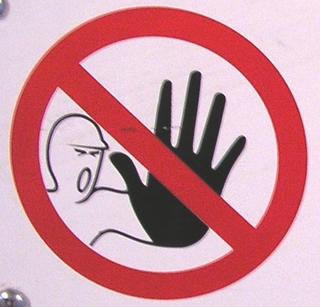
What does this sign mean?
a. Do not put your hand in the hot tarmac
b. No admittence to unauthorized personnel
c. No gloves allowed on site
d. Abusive behaviour to our staff will not be tolerated
(correct answer is in the comment section)
Thursday, September 22, 2005
Your new patient nurse check
[on the radio: advertisement for an insurance company]
Stand here… Minus your shoes… 55 kg
Now here… do you know your height?
Please sit down, while I fill in the questionnaire
[on the wall: Lambeth Parenting – Strategies and counselling]
Country of birth?
Senegal… Sierra Leon… Palestine… where is it now
[on the radio: Beethoven’s moonlight Sonata]
Here we are, Israel
Mother tongue?
[on the wall: I think I’m pregnant]
Can you read and write in Hebrew?
Have you ever smoked?
[Moonlight Sonata, music getting stronger]
So about three alcohol units per week,
What do you do?
[On the wall: option a: I want to become a parent]
How would you describe your diet?
lots of fruit, vegetables and fish?
Do you exercise?
[on the wall: I need help in becoming a parent]
Any cancer in the family?
Any relatives with heart problems? stroke?
[on the wall: a picture of a young girl wearing a black gown and a strange square shaped hat, holding a rolled paper]
Diabetes? any other illness?
is it like an allergy?
a liver disease... code j.
[on the wall: another photograph, of five women. Three of them are wearing traditional dress: one, as in the other photo, in traditional British academic dress, in black, and two in traditional African dress, with colourful patterns]
That’s all done now.
Have a good day dear
[Moonlight Sonata, fading out]
[on the wall: PRESS BUTTON TO EXIT]
Monday, September 19, 2005
back
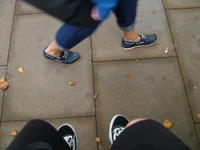
after a couple of weeks in the countryside
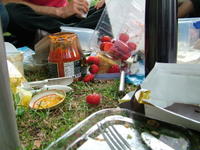
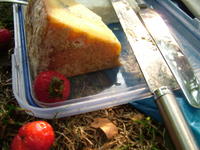 and some more time to get over the culture shock
and some more time to get over the culture shock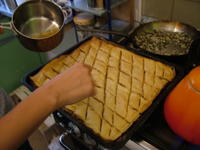
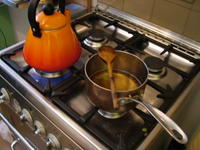
just in time for my birthday in st james park
(it almost rained but then it didn't)
even the electronic sadhu showed up
and finally, some bourgeois domesticity..
a nice stable flat until the end of the year, in Bonniland
Thursday, August 25, 2005
Tuesday, August 23, 2005
Off With Their Heads
It compares only to the national obsession with celebrities. Actually, it’s very much the same thing: make people into gods only to throw them into the gutter later. Only to present them into a poor victim in the next round.
I sometimes wonder if it’s compensation for never having guillotines.
So now it’s Ian Blair, the Commissioner for the Metropolitan Police, who will have to go over the Stockwell shooting. Even I got carried away with it. The press is getting excited, drama is building up, they all see someone’s head is about to roll and they’re luving it.
So the Ee Menezes affair becomes an Ian Blair-will-he-get-the-sack thing.
Individuals are rarely the problem, and removing a person rarely solves much. Ian Blair has to go, but he’s not the problem with the Stockwell shooting. The problem, for me, is the blind willingness of the British public to accept draconic measures without questions, at a time of threat. The problem is 70 percent of the British public who supported ‘shoot-to-kill’ without understanding what it actually meant. The problem is comments such as:
Mr Menezes was a tragic mistake. But as far as I am concerned, the police can shoot as many Islamic terrorists as they like.
(comment in RaedintheMiddle.blogspot.com)
Or:
I have previously supported most of the Stop the War Coalition actions but this [vigil for De Menezes] is quite revolting ... This was as unfortuate event but in light of our societies current postion it would appear inevitable that mistakes will happen.
(Post in London Indymedia)
Anyone with any idea about suicide bombing will tell you that implementing ‘shoot-to-kill’ on public transport is ludicrous. Whoever came up with this idea must have watched Blade Runner too many times. ‘Shoot-to-kill’ means shooting suspects without warning (because any warning and they’ll blow themselves up). On what basis? What is enough to get a man killed? Not much as we have seen in Stockwell. Any person who looks like some blurry CCTV picture or acts a bit strange can be shot in the head.
MADNESS












